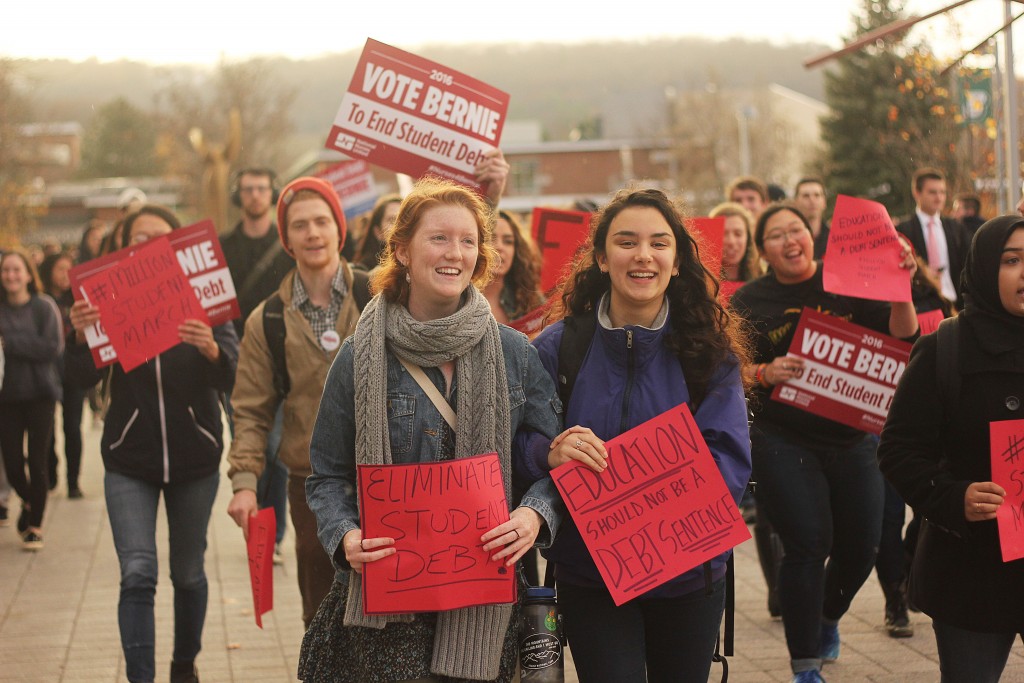
Binghamton University students donning red and holding signs proclaiming “education is a human right” and “give us a living wage” took part in the Million Student March.
The Million Student March is a national movement, and demonstrations took place on Thursday at over 100 campuses across the country including Texas State and University of Massachusetts at Amherst. At BU, around 25 protesters gathered at the Pegasus statue and walked down the Spine, through the Marketplace and Tillman Lobby until they reached the Peace Quad. There, they demanded free public university tuition, forgiveness of all student loans and a $15 minimum wage for all student workers.
Sara Hobler, the organizer of the march and a sophomore double-majoring in sociology and history, said that she had heard about the movement when it formed in August. When she couldn’t find anyone organizing the march at BU, she took it upon herself to organize the event and encourage others to come out and protest for free public education.
“It is a worthy goal to fight for,” she said. “If we on this campus can be a part of a movement that can make college tuition-free, then that’s a worthy thing to get behind.”
Hobler and others are founders of College Progressives, a student organization looking to get chartered by the Student Association (SA) this year. According to Farihah Akhtar, a fellow organizer and sophomore majoring in political science, the goal of forming the club and organizing protests like the Million Student March are to encourage activism at BU.
“We want students to take initiatives, and we want collaborations and coalitions to be formed on this campus and nationwide so our demands can be met,” Akhtar said. “If we get together and form a union, legislators have to hear us.”
After the march, protesters gathered in the Peace Quad to tell their personal stories of student debt, and why they believed free education was a human right.
Caitlin Stevens, a senior majoring in medieval and early modern studies, shared her experience of transferring to BU because she was already in debt from her time at Elmira College. Now, she works a part-time job to attend school because she feels that having a degree is a necessity for her future.
“We’re racking up hundreds of thousands of dollars [of debt] because we need that degree,” Stevens said. “A bachelor’s degree is equal to a high school education — you just can’t go anywhere without it.”
Jonathan Taubes, a junior majoring in political science, also shared his story, and said that although some may look at the march’s demands as idealistic, the increasing student debt status of the country is unsustainable.
“There is a student debt bubble that already exists, and the trend of student debt is only increasing,” Taubes said. “It is a national crisis, and we have to change it or it will eventually change itself when the bubble bursts. Feasible be damned; it is our job to make it feasible.”
Hobler also said that the march came at an opportune time, when students around the country have been rallying behind University of Missouri students protesting racial injustice.
“The Million Student March makes college more accessible for the students of color who are being discriminated against, such as at Missouri,” she said. “It’s not important only as an economic distribution, but as a racial justice issue for free college to exist.”
At the end of the march, students said they felt that through protesting, they had the power to make real change for free tuition at a national level.
“If you think that protests don’t do anything, you have your eyes closed,” Hobler said. “”[The Million Student March] is making national news; people are paying attention and hopefully the government pays attention next.”


